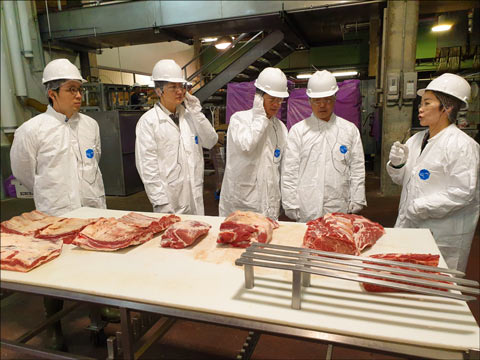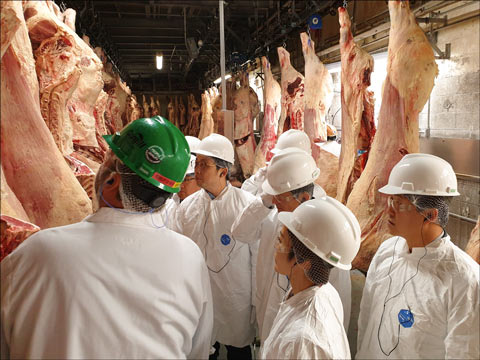



Korean Buyers Explore US Beef, Pork Production & Retail Merchandising
US - Encouraging major food retailers in South Korea to offer their customers additional US beef and pork products, USMEF led a team of buyers on a tour of packing plants and supermarkets in Nebraska and Iowa.
The effort, which brought representatives from Korean companies E-Mart, E-mart Traders, E-Mart Everyday, GS Supermarkets and Top Mart to the Midwest, was funded by the United Soybean Board, the Beef Checkoff Programme and the National Pork Board.
USMEF is a subcontractor of the Beef Checkoff and a contractor of the National Pork Board.
"The growth of supermarket chains and 'big box' retailers in Korea has slowed somewhat due to an economic downturn and intense competition with e-commerce, but fresh foods sold at retail are expected to continue rapid growth in the country," said Jihae Yang, USMEF director in Korea.
"Among the fresh food items, an increase in chilled red meat sales – US chilled beef and pork is the driving force for that growth – has been a positive sign. Because of this, we organized this retail buyer team to give them a firsthand look at the US red meat industry and how red meat is merchandised in stores. Our goal was to help them in their efforts to expand the presence of US beef and pork in Korea’s retail sector."
E-Mart is a large supermarket chain in Korea, operating 140 stores nationwide. Yang noted that E-Mart recently added US chilled pork, partially displacing Canadian chilled pork in some stores.
E-Mart Traders operates wholesale locations similar to Costco, and recently began focusing on US beef sales by increasing shelf space in its stores. E-Mart Everyday is a supermarket chain that shut down its own butcher shops and now outsources case-ready meats. GS Supermarkets is operating more than 300 stores and has expanded its offerings of meat items. Top Mart operates 76 stores and had its biggest year for US meat sales in 2018.
The team’s initial stops were at Walmart, Target, Costco, Whole Foods and Trader Joe’s stores in the Omaha, Nebraska, area. The retail tour provided a look at innovative packaging of red meat to increase shelf life and to improve merchandising of various cuts.

"Retailers in Korea are always looking for improved methods of packaging that not only expand the life of the product, but also attract consumers who are shopping for quality meat products," explained Yang.
"Stops at these major retailers were a big help for the team to gather ideas. We also toured specialty meat shops in and around Omaha for greater perspective."
Visits to Cargill’s beef plant in Schuyler, Nebraska, and Seaboard’s pork plant in Sioux City, Iowa, allowed the Korean buyers to witness the efficiency and production capacity of US packing plants.

"We received a lot of positive feedback, especially about the plant tours," said Junil Park, USMEF retail specialist in Korea, who joined Yang in leading the team on its US visit.
"Jungsun Kim, a director of Top Mart, told us that the plant visits were very informative and gave him a good understanding of the production procedures involving US beef and pork. He also said it helped answer key questions as his company makes plans to offer its customers additional US meat items."
To give the team insight into other stages of beef production, a visit to Knobbe Feedyards in West Point, Nebraska, was arranged. The team learned about finishing US cattle and the advantages of grain-fed US beef. Knobbe, a family-owned operation, annually feeds about 5,000 head of cattle that are processed and exported around the world.
US beef exports to Korea are on a record pace in 2019 and set consecutive monthly value records in June and July. Through July, exports totaled nearly 152,00 metric tons (mt), up 11 percent from a year ago, valued at $1.1 billion (up 14 percent). After soaring to new heights in 2018, pork exports to Korea have moderated with January-July volume down 11 percent to 131,354 mt, valued at $369.6 million (down 13 percent).
TheCattleSite News Desk


